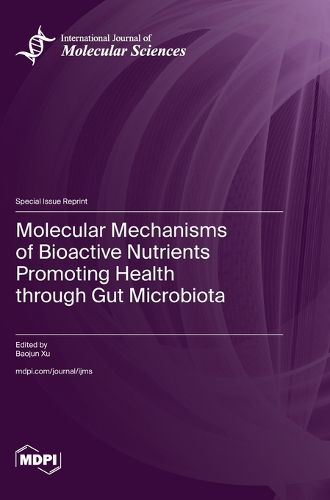Readings Newsletter
Become a Readings Member to make your shopping experience even easier.
Sign in or sign up for free!
You’re not far away from qualifying for FREE standard shipping within Australia
You’ve qualified for FREE standard shipping within Australia
The cart is loading…






This title is printed to order. This book may have been self-published. If so, we cannot guarantee the quality of the content. In the main most books will have gone through the editing process however some may not. We therefore suggest that you be aware of this before ordering this book. If in doubt check either the author or publisher’s details as we are unable to accept any returns unless they are faulty. Please contact us if you have any questions.
Many food components (such as phytochemicals, carbohydrates, proteins, fats, vitamins, minerals, etc.) have been found to have various biological activities. Based on dietary intake and the availability of nutrients in the intestine, human gut microbiota can produce harmful metabolites that cause human diseases or beneficial compounds that prevent host diseases. Abnormal gut microbiota can produce endotoxins, exacerbating chronic inflammation and metabolic disorders. Moreover, gut microbiota is crucial for maintaining metabolism and health, and dysbiosis plays a crucial role in the occurrence and development of various diseases. Therefore, a promising strategy to help manage colon and host health is to regulate the composition of the gut microbiota by eating biologically active food ingredients. Bioactive ingredients obtained from dietary sources can be designed and characterized to meet human nutritional and immune needs and balance gut microbiota. To maximize knowledge on the health effect of gut microbiota on improving human health, a Special Issue titled "Molecular Mechanisms of Bioactive Nutrients Promoting Health through Gut Microbiota" was published in the International Journal of Molecular Science, including nine papers: six research articles and three reviews. Among these six research articles, four are animal studies, one is an in vitro gut microbiota culture study, and one is a randomized clinical study.
$9.00 standard shipping within Australia
FREE standard shipping within Australia for orders over $100.00
Express & International shipping calculated at checkout
This title is printed to order. This book may have been self-published. If so, we cannot guarantee the quality of the content. In the main most books will have gone through the editing process however some may not. We therefore suggest that you be aware of this before ordering this book. If in doubt check either the author or publisher’s details as we are unable to accept any returns unless they are faulty. Please contact us if you have any questions.
Many food components (such as phytochemicals, carbohydrates, proteins, fats, vitamins, minerals, etc.) have been found to have various biological activities. Based on dietary intake and the availability of nutrients in the intestine, human gut microbiota can produce harmful metabolites that cause human diseases or beneficial compounds that prevent host diseases. Abnormal gut microbiota can produce endotoxins, exacerbating chronic inflammation and metabolic disorders. Moreover, gut microbiota is crucial for maintaining metabolism and health, and dysbiosis plays a crucial role in the occurrence and development of various diseases. Therefore, a promising strategy to help manage colon and host health is to regulate the composition of the gut microbiota by eating biologically active food ingredients. Bioactive ingredients obtained from dietary sources can be designed and characterized to meet human nutritional and immune needs and balance gut microbiota. To maximize knowledge on the health effect of gut microbiota on improving human health, a Special Issue titled "Molecular Mechanisms of Bioactive Nutrients Promoting Health through Gut Microbiota" was published in the International Journal of Molecular Science, including nine papers: six research articles and three reviews. Among these six research articles, four are animal studies, one is an in vitro gut microbiota culture study, and one is a randomized clinical study.